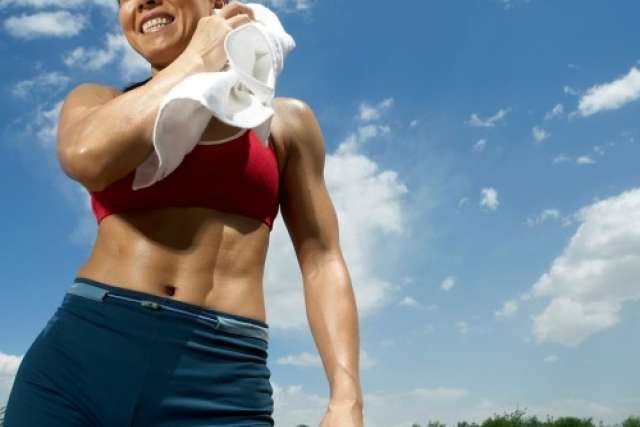We all know it’s important to stay hydrated when exercising, but just how much should we be drinking?
It depends. Sweating is the primary way we lose fluid, but each of us loses it at a different rate – which means each of us has a different amount to drink.
Instead of winging it, says Dr. Daniel Vigil, associate clinical professor at David Geffen School of Medicine and team physician at UCLA, it’s vital to “replace our sweat losses without over-replacing them.”
To do this, we need to first determine our sweat rate: how much and how fast we perspire during exercise.
It’s easy to calculate our sweat rate, and if we follow Vigil’s guidelines, it only takes an hour as part of your regular exercise.
Here’s how:
- Weigh yourself in the nude just before exercising. Make sure you’ve emptied your bladder beforehand.
- Exercise for exactly one hour without eating or drinking anything. This can be any exercise you’d like; the point is for the strain and intensity of the exercise to mimic a typical workout or activity you’re trying to do. For example, someone who’s training for a marathon could exercise by running at the same pace they would for the actual race.
- Weigh yourself in the nude again. Make sure you’ve dried yourself off completely.
- Calculate your weight difference and convert it to kilograms. Subtract your weight after the workout from your weight before.
- Multiply that number by 1,000 to find your sweat rate in milliliters per hour. For example, if your weight loss was 0.5 kg, multiplying that by 1,000 makes your sweat rate 500 mL per hour.
A typical sweat rate for a healthy, average-sized person hovers around the 500 mL per hour range. That number tells you what rate you should be hydrating at. So if your sweat rate is 500 mL per hour, you should ideally be drinking that much; not much more, not much less.
Of course, our sweat rate depends on a few things, and it can change. “Your fitness, the type of exercise you’re doing, the temperature outside, and the humidity all affect sweat rate,” says Vigil. It’s important to keep tabs on these factors to hydrate appropriately.
While it is okay to just drink the amount that feels right under most circumstances, Vigil advises that you’re better off regulating your fluid intake during exercise. “Staying hydrated during physical activity helps to maintain performance. A body water deficit of greater than 2% of body weight marks the level of dehydration that can adversely affect performance.”
So if you’re about to hit the gym, grab a water bottle and make sure you’re drinking the right amount.




